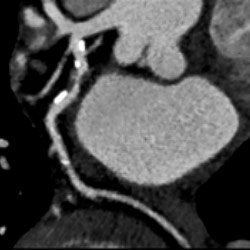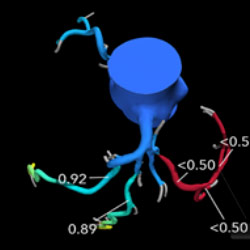
Coronary computed tomography angiography (CCTA) is a noninvasive heart imaging test that generates three-dimensional (3D) images of your heart, coronary arteries and great vessels.
During the test, you will receive standard iodine-containing contrast material as an intravenous (IV) injection to help obtain better images. The scan is acquired seconds after the contrast is administered, in which x-rays pass through the body and are sensed by detectors in the scanner to produce high-quality 3D images.
If more details are needed to assess your coronary arteries, a HeartFlow analysis may be ordered. This analysis uses your CCTA scan (no additional imaging required) to provide further information for your doctor.

You may have a CCTA as an outpatient appointment or as part of your stay in the hospital. This test may be done for:
- Stable or acute chest pain syndrome
- Suspected or known coronary artery anomaly
- Preoperative evaluation
- Alternative to invasive angiography
- Assess patency of bypass graft
- Abnormal stress test
Be sure to tell the technologist if you have ever had a reaction to contrast material, if you are pregnant or think you may be pregnant.
Wear comfortable, loose-fitting clothes to your test. You may be asked to remove your clothing, any metal objects (jewelry, bobby pins, eyeglasses, etc.) which may affect CT images, and be given a gown to wear.
The technologist or nurse will place an intravenous (IV) catheter in your hand or arm. Contrast material used in the CCTA will be injected through the IV during the scan.
During the CCTA, you will be positioned on an examination table. Your heart rate and blood pressure will be monitored during the test. The nurse may administer a beta-blocker medication to help lower your heart rate and nitroglycerin tablet to help dilate your coronary arteries.
The technologist will give you breathing instructions. You will hold your breath for short periods of time and be asked to remain perfectly still.
The CCTA scan takes approximately 20 to 30 minutes. While in the scanner, the technologist will be able to see, hear and speak with you using a two-way intercom.
A cardiologist or radiologist will interpret your CCTA scan and provide a report to your referring or primary doctor. A follow-up appointment with your doctor may be necessary to review the results of your scan.
If contrast material was used during your CCTA scan, you may be watched for a period of time for any reactions. These include itching, swelling, rash or trouble breathing.
Contact your doctor if you notice any pain, redness or swelling at the IV site after returning home. These could be signs of an infection or other type of reaction.
You may resume your usual diet and activities unless your doctor tells you differently.




